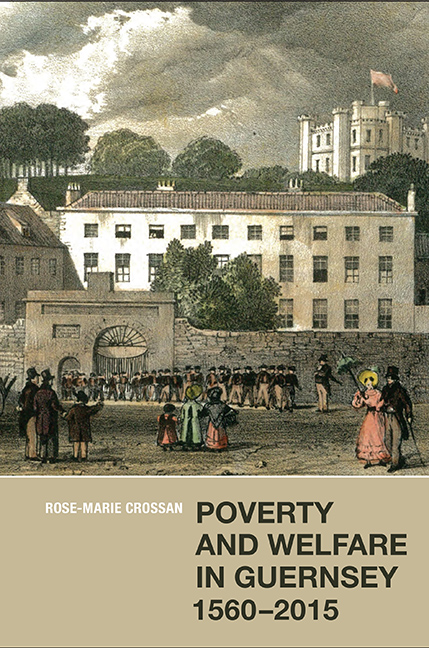Book contents
- Frontmatter
- Dedication
- Contents
- List of Illustrations
- Acknowledgements
- Abbreviations
- Conventions, Note on curren
- Maps
- Introduction
- I Context
- II Welfare
- III Town Hospital
- IV Twentieth Century and Beyond
- Conclusion
- Appendix 1 Writings on Peasant Proprietorship in Guernsey
- Appendix 2 Poor Rates, Indoor and Outdoor Relief Spending, St Peter Port, 1724–1924
- Appendix 3 Parochial Poor Relief in Other Channel Islands
- Appendix 4 Average Year-end Head-counts and Average Annual Admissions and Discharges, Town Hospital, 1700s–1900s
- Appendix 5 Adult Admissions Ascribed to Illness and Accidents, Town Hospital, 1852–1919
- Appendix 6 Relative Proportions of Men and Women in Year-end Head-counts and Annual Admissions, Town Hospital, 1750–1919
- Appendix 7 Annual Averages of Child Admissions and Year-end Numbers, Town Hospital, 1756–1919
- Appendix 8 Over-60s as a Proportion of all Inmates, and Composition by Sex of Over-60s Cohort, Town Hospital, 1756–1911
- Appendix 9 Average Weekly Amounts Purchased per Head, Town Hospital, 1760–1917
- Appendix 10 Timeline: Developments in Poor Relief and Social Security, 1700–2010
- Bibliography
- Index
- Frontmatter
- Dedication
- Contents
- List of Illustrations
- Acknowledgements
- Abbreviations
- Conventions, Note on curren
- Maps
- Introduction
- I Context
- II Welfare
- III Town Hospital
- IV Twentieth Century and Beyond
- Conclusion
- Appendix 1 Writings on Peasant Proprietorship in Guernsey
- Appendix 2 Poor Rates, Indoor and Outdoor Relief Spending, St Peter Port, 1724–1924
- Appendix 3 Parochial Poor Relief in Other Channel Islands
- Appendix 4 Average Year-end Head-counts and Average Annual Admissions and Discharges, Town Hospital, 1700s–1900s
- Appendix 5 Adult Admissions Ascribed to Illness and Accidents, Town Hospital, 1852–1919
- Appendix 6 Relative Proportions of Men and Women in Year-end Head-counts and Annual Admissions, Town Hospital, 1750–1919
- Appendix 7 Annual Averages of Child Admissions and Year-end Numbers, Town Hospital, 1756–1919
- Appendix 8 Over-60s as a Proportion of all Inmates, and Composition by Sex of Over-60s Cohort, Town Hospital, 1756–1911
- Appendix 9 Average Weekly Amounts Purchased per Head, Town Hospital, 1760–1917
- Appendix 10 Timeline: Developments in Poor Relief and Social Security, 1700–2010
- Bibliography
- Index
Summary
Foundation
St Peter Port first decided to raise a tax to fund poor relief in 1724. In the mid-1730s, parishioners tired of this, and an attempt was made to revert to voluntary contributions. These proved insufficient and, on 21 September 1738, a parish meeting heard that poor relief funds had run out, necessitating an immediate levy of 4,000 livres tournois (about £285 sterling). A fortnight later, Chefs de Famille took the decision to build a workhouse. Where did parishioners get this idea? What wider knowledge and experience might have suggested such a course?
St Peter Port had had a small medieval hospital which, although used for the poor in the Calvinist era, had not survived beyond the seventeenth century. Many of Europe's 10,000 or so medieval hospitals had met a similar fate. During a wave of welfare reform in the sixteenth and seventeenth centuries they had been superseded by larger institutions. Typical of these in an English context were the major London hospitals – St Bartholomew’s, St Thomas’s, Christ’s, Bridewell, Bethlem – most refounded or remodelled in the sixteenth century. Of these, Bridewell is of particular interest to the workhouse historian. Whereas the others were intended for the sick, disabled and infirm, Bridewell was conceived as a ‘house of labour and occupations’ where the ‘idle’ poor were to be set to work. As well as being the ancestor of the house of correction, it was also the ancestor of the modern workhouse. Bridewell had no parallel elsewhere and it was soon imitated all across northern Europe. Amsterdam, Bremen, Lubeck, Hamburg and Danzig all had Bridewell-type workhouses by the early 1600s. The French version came in the form of the hôpital général, designed to reform the ‘idle’ poor through work and religious instruction. The first such hôpital was opened in Lyon in 1622, and several were founded in Normandy and Brittany in the second half of the seventeenth century. As well as hôpitaux généraux, eighteenth-century France had a network of state-sponsored dépôts de mendicité, punitive institutions aimed at clearing beggars from the streets, which were more akin to houses of correction. By the 1730s, St Peter Port's merchants, trading widely with French, Dutch and Baltic ports, would have been well acquainted with European institutions of this kind.
- Type
- Chapter
- Information
- Poverty and Welfare in Guernsey, 1560-2015 , pp. 115 - 144Publisher: Boydell & BrewerPrint publication year: 2015



